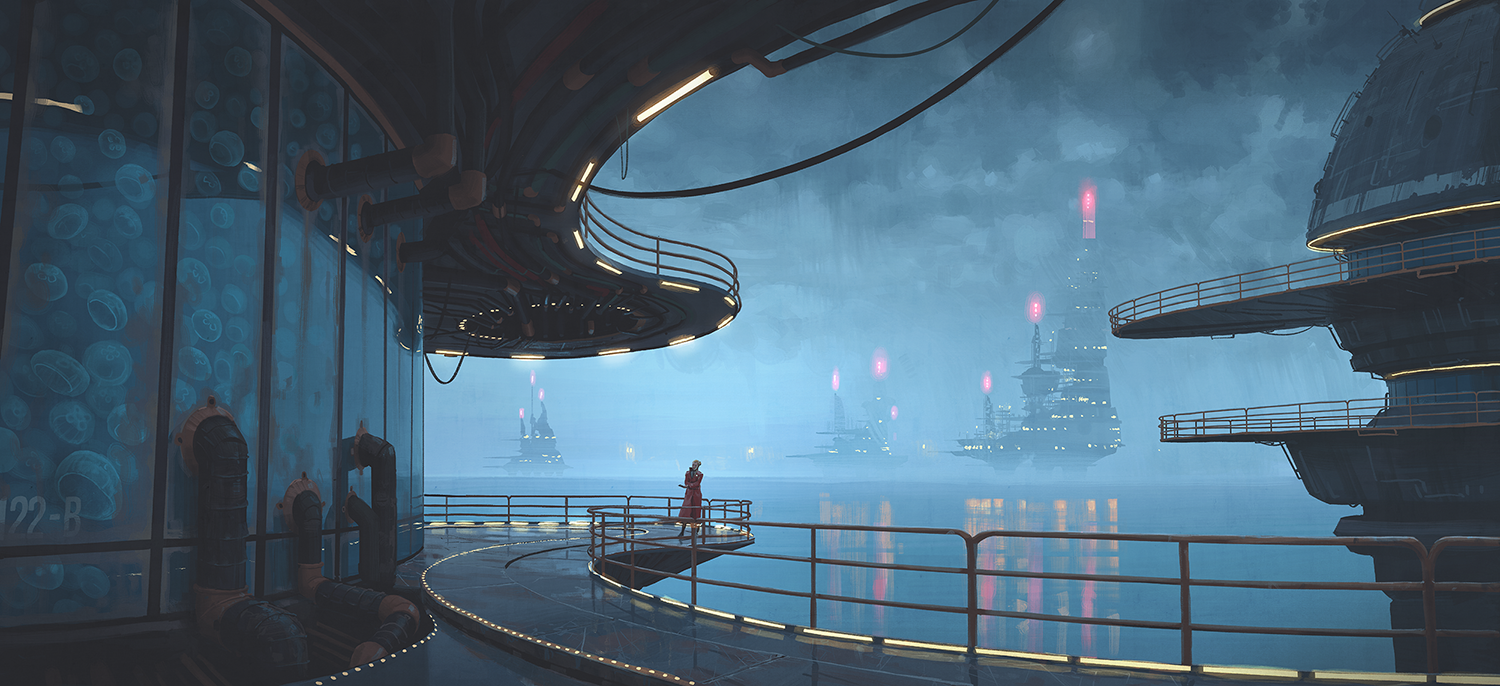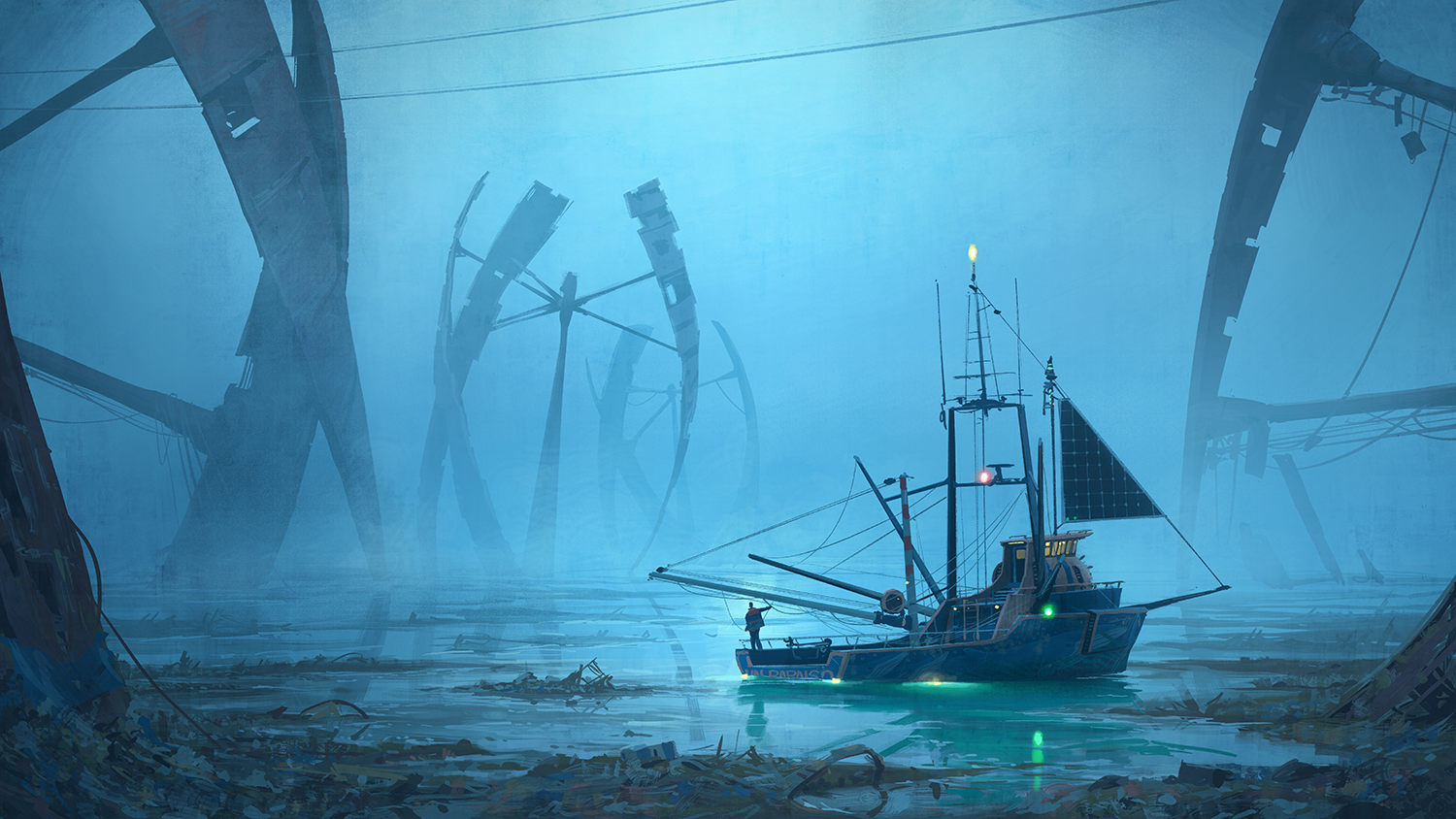






The Project
The Project
The project & its impact
Introducing radical ocean futures...A Collaborative #ARTSCIENCE initiative & EXPERIMENTAL FUTURING PROJECT.
Welcome intrepid explorer of the future oceans....
This project is founded on the belief that sometimes science fiction might succeed where scientific papers fall short. It blends art and science and merges scientific fact with creative speculation. The heart of the project is four short 'Radical Ocean Futures.' These are scientifically grounded narratives of potential future oceans. Each narrative is supported by both a visual and a musical interpretation to allow multiple entry points and stimulate the imagination. The purpose of this project is to explore tools that can help us to think creatively and imaginatively about our future oceans and assess how unexpected changes, along with human responses to those changes, may play out in a complex world that is, at its heart, surprising.
This project was financed through a science communications grant from The Swedish Research Council Formas and has had significant impact. The project has been featured in WIRED, a Nature editorial, an article in The Proceedings of the National Academy of Sciences (PNAS) and was chosen as the Official artwork by the government of Sweden for the Inaugural UN Ocean Conference and displayed in the lobby of the General Assembly building at the United Nations Headquarters in New York.
The Radical Ocean Futures project has also been featured in a number of international Art Exhibitions. This includes ‘Ocean Dwellers: Art, Science and Science Fiction’ at the Nordic Embassies in Berlin and ‘Critical Tide’ at the Helsinki Design Museum. The Project features in the newly launched London Science Museum - Science Fiction: Voyage to the Edge of Imagination Exhibition. This exhibition will tour science Museums globally four five to seven years now that it closed its successful extended run in August 2023.
The project has also featured on a number of podcasts including in an episode of one of Sweden’s most popular podcasts ‘P3 Dystopia’ in an episode about the future Ocean entitled; ‘När havet dör’
Finally, the project will be featured as part of an upcoming special issue of Vector, the key journal of the British Science Fiction Association.
DRAWING ATTENTION TO RELATED PROJECTS
As well as the Radical Ocean Futures Project, on this website you will find other examples of likeminded scientific collaborations around different dimensions of the future ocean including the Fisheries Conflict Futures project led by Jessica Spijkers and work on High Seas Futures led by Hannah Marlen Lübker & Laura Pereira. Further relevant scientific work will be added over time to the website to showcase the different science + storytelling approaches to the future of the ocean.
“Earth’s oceans are having a rough time right now. They’re oily, hot, acidic, full of dead fish—and their levels are rising. But even though these things are true, it can be hard to grok (or muster up the will to care about) the oceans’ subtle changes over decades. Every time you go to the beach, everything’s still as blue and salty and vast as it ever was. But these changes directly impact human life (just ask the Marshall Islands). So to make the ocean’s plight more relatable, a Swedish sustainability group is putting out a message that will hit you where it counts: right in the nerd.”
“Some of the scenarios painted — in both the fictional tales of the future ocean and the high-emissions scenarios of climate modellers — are something that society, scientists included, should be desperate to avoid. To do so, data and evidence remain the priority. But in a world where both are so easily trumped by a seductive (and false) counter-narrative, perhaps more researchers should also learn to tell tales as they look ahead.”

The Science
The Science
Scientific paper
Title: Radical ocean futures-scenario development using science fiction prototyping
Author team: Andrew Merrie, Patrick Keys, Marc Metian and, Henrik Österblom
Journal: Futures - The journal of policy, planning and futures studies
highlights
Applies the method of science fiction prototyping to the future of fisheries.
Presents four ‘radical’ and compelling narrative scenarios.
Each scenario is supported by a strong scientific evidence base.
The scenarios account for complexity and non-linear change.
Scenarios reflect interaction of ecological, technological & socio-economic change.
ARTICLE ABSTRACT
Scenarios can help individuals, communities, corporations and nations to develop a capacity for dealing with the unknown and unpredictable, or the unlikely but possible. A range of scientific methods for developing scenarios is available, but we argue that they have limited capacity to investigate complex social-ecological futures because: 1) non-linear change is rarely incorporated and: 2) they rarely involve co-evolutionary dynamics of integrated social-ecological systems. This manuscript intends to address these two concerns by applying the method of science fiction prototyping to developing scenarios for the future of global fisheries in a changing global ocean. We used an empirically informed background on existing and emerging trends in marine natural resource use and dynamics to develop four ‘radical ocean futures,' incorporating and extrapolating from existing environmental, technological, social and economic trends. We argue that the distinctive method as applied here can complement existing scenario methodologies and assist scientists in developing a holistic understanding of complex systems dynamics. The approach holds promise for making scenarios more accessible and interesting to non-academics and can be useful for developing proactive governance mechanisms.
The scenario space. Narrative scenarios are represented in a two dimensional space and each illustration is a representation of a key defining element for each of the four ‘radical ocean futures’. These four ‘radical ocean futures’ do not represent ‘the’ future but four possible futures. The ‘collapsed to sustained’ on the horizontal axis refers to the ecological dimension and the ‘fragmented to connected’ on the vertical access refers to the societal dimension.
If you would like to read the full article (published open access under a creative commons licence) please head over to the Futures website.

Stories about our future oceans
Stories about our future oceans
Sci-fi narratives - Science-based stories about our future oceans
Scenario building via science fiction prototyping
The four scenarios are built on a robust foundation of scientific knowledge, including:
1) Technological frontiers
2) Marine ecology, ocean and fisheries science
3) The global fishing and seafood industry
4) Marine management, governance and socio-economic shifts
The scenarios were developed following the method of Science-Fiction Prototyping, developed by Brian David Johnson when he was the futurist at Intel Corporation. Mr Johnson is now the futurist in residence at Arizona State University, Center for Science and the Imagination. This method is described in detail in the scientific paper published in the journal Futures.
I have also written a commentary piece for Rethink.earth titled 'Can science fiction reimagine the future of global development?' You can read it here
Here you will find an interview with the global design firm Designit about how the Science Fiction Prototyping approach used in the Radical Ocean Futures project is relevant and useful for design practice.
We have linked key elements in each of the narrative scenarios to relevant peer-reviewed academic papers, news articles from reputable publications and credible websites to give you the opportunity to explore beyond Radical Ocean Futures. We wish you well on your explorations into the future oceans and the scientific work that helps us to imagine them.

The artist - Simon Stålenhag
The artist - Simon Stålenhag
Artworks - Simon Stålenhag
The beautiful and engaging artworks that are a feature of the Radical Ocean Futures #artscience project were created by the world renowned Swedish concept artist and illustrator Simon Stålenhag. His work has been featured in; The Verge, Gizmodo, Booooooom.com and The Huffington Post among others. He has also successfully kickstarted collections of his work, has a science fiction TV series ‘Tales from the Loop’ available on Amazon Prime Video and has sold the rights to his story collection ‘Electric State’ to Universal Pictures who are beginning production on a film based on his work.
Right from the beginning, this was a true creative collaboration and the original pieces of concept art that you see on this site, so vividly supporting the narrative scenarios of the future oceans, are the result of this collaboration. Below is a small sampling of his other work. If you would like to have the opportunity to work with Simon or see his iconic body of work, please head over to his website.
All images used with permission, and copyright Simon Stålenhag.

The music - K La Luna
The music - K La Luna
Music - K. La Luna
K. La Luna is the talented musical alter ego of Dr. Kaitlyn Rathwell. Kaitlyn is a sustainability scientist and a musical artist who dedicates her life to the alchemical fusion of art and science in many forms. Kaitlyn was commissioned by the Radical Ocean Futures project to produce original musical interpretations for each of the stories about our future oceans. Accompanying each of the stories about our future oceans, you will find an embedded Soundcloud player where you can listen to these beautiful and compelling pieces of music created for this project. If you would like to learn more about K. La Luna and her work or engage her in a project of your own, please head to her tumblr. If you would like to support K. La Luna by buying her music, please head to her Bandcamp page.
The musical interpretations have been developed as a creative collaboration between; K. La Luna, the Radical Ocean Futures project at the Stockholm Resilience Centre and Albaeco, an organisation working with strategic environmental communication.
All music used with permission, and copyright K. La Luna.

About
About
About
Kia Ora, my name is Andrew, originally from New Zealand, now living in Sweden. During my PhD, I was part of a global interdisciplinary academic programme on 'predicting the future oceans.' While engaging with the immensely talented colleagues in the programme and over the course of my research, I started asking questions...
What does it feel like to live in a future where the oceans are radically different than today? How would humans respond? How could we respond? How might we solve these complex challenges? or fail to solve them? Can thinking differently and more imaginatively about the future oceans influence the way we govern our oceans? If there are exponential, disruptive shifts in technologies such as artificial intelligence, genetic engineering and additive manufacturing, what does that mean for ocean ecosystems? These questions were the beginning of the Radical Ocean Futures project
Radical Ocean Futures, in manuscript form, including earlier versions of the four scenarios, but without any amazing art or music, was also the final chapter of my PhD dissertation -
Global Ocean Futures: Governance of marine fisheries in the Anthropocene.
Thanks to all those who helped bring the project to life. Special thanks to my co-authors, the UBC-Nippon Foundation Nereus Program, the Swedish Research Council Formas, The Stockholm Resilience Centre, and Albaeco.
All project enquiries should go to Andrew who can be contacted at:
radicalearthfutures@gmail.com or on +46 (0)70 723 45 97
Here, Andrew presents the Radical Ocean Futures project to the President of the 71st Session of the United Nations General Assembly, Mr Peter Thomson during the UN Oceans #saveourocean SDG 14 meeting in June 2017










